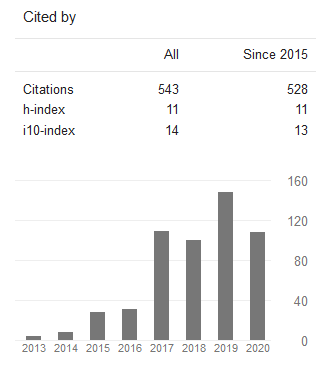Adopsi Theory of Planned Behavior Untuk Pengembangan Model Pengaruh Budaya Terhadap Penggunaan E-Commerce
DOI:
https://doi.org/10.24002/jbi.v8i2.1078Abstract
Abstract.
E-commerce transactions in Indonesia reached up to IDR 68 trillion in 2016. The use of e-commerce is influenced by culture which consists of five dimensions such as power distance, individualism, masculinity, uncertainty avoidance, and long-term orientation. This paper proposes a model to investigate influence of culture on the intentions and individual behavior using e-commerce. This model is developed by adopting the Theory of Planned Behavior (TPB). Culture dimensions are used as indicators of support in the model. The theory can be used to examine and predict factors that influence intentions and individual behavior using e-commerce. These factors can be used to create a new marketing strategy for business people. In an academic area, this model can be used as an alternative model to predict intentions and individual behavior using information technology, especially e-commerce.
Keywords: Culture dimensions, Theory of Planned Behavior, e-commerce.
Abstrak.
Di Indonesia, transaksi e-commerce pada tahun 2016 mencapai 68 triliun rupiah. Penggunaan e-commerce ini tentu sangat dipengaruhi oleh budaya masyarakat. Budaya terdiri dari lima dimensi, yaitu power distance, individualism, masculinity, uncertainty avoidance, dan long-term orientation. Makalah ini bertujuan mengajukan model untuk mengetahui pengaruh budaya terhadap niat dan perilaku individu menggunakan e-commerce. Model yang dikembangkan mengadopsi dari Theory of Planned Behavior (TPB), karena TPB dapat digunakan untuk menguji dan melakukan prediksi terhadap perilaku individu dalam pengunaan e-commerce. Dimensi budaya digunakan sebagai indikator pada model TPB untuk mendukung pengujian dan prediksi niat dan perilaku individu dalam menggunakan e-commerce. Bagi para pelaku bisnis yang menggunakan e-commerce sebagai media penjualan, faktor-faktor yang berpengaruh pada model TPB ini dapat dijadikan target dalam membuat strategi pemasaran untuk meningkatkan penjualan sedagnkan dalam bidang akademik, makalah ini menyediakan model alternatif yang dapat digunakan untuk memprediksi dan menguji perilaku individu dalam penggunaan teknologi informasi khususnya e-commerce.
Kata Kunci: Dimensi budaya, Theory Planned Behavior, e-commerce.
References
Adhi. 2016, Januari 4. Transaksi eCommerce di Indonesia Tembus Rp 68 Triliun. Dipetik Desember 14, 2016, dari money.id: http://www.money.id/digital/2016-transaksi-ecommerce-di-indonesia-tembus-rp-68-triliun-160104k.html
Al-Qudah, A.O., & Ahmad, K. 2014. The Roles of Culture in Online Shopping to Enhance E-Commerce in Jordan. Conference Proceedings - 6th International Conference on Information Technology and Multimedia at UNITEN: Cultivating Creativity and Enabling Technology Through the Internet of Things, 113–117.
Ajzen, I. 1991. The Theory of Planned Behavior. Orgnizational Behavior and Human Decision Processes, 50: 179–211.
Ajzen, I., & Madden, T.J. 1986. Prediction of Goal-Directed Behavior: Attitudes, Intention and Perceived Behavioral Control. Journal of Experimental Social Psychology, 22: 453–474.
Al-Lozi, E., & Papazafeiropoulou, A. 2012. Intention-Based Models: The Theory of Planned Behavior Within the Context of IS. In Springer, 2: 323–347.
Bandura, A. 1982. Self-efficacy Mechanism in Human Agency. American Psychologist, 37(2): 122–147.
Boateng, R., Heeks, R., Molla, A., Hinson, R. 2008. E-commerce and Socio-economic Sevelopment: Conceptualizing the Link. Internet Research. 18(5): 562 - 594
Chatterjee, S. 2015. E-Commerce in India: A review on Culture and Challenges. 2015 International Conference on Soft Computing Techniques and Implementations (ICSCTI). 105-109.
Crespo, H. Á., & Del Bosque, R. I. 2008. The Effect of Innovativeness on The Adoption of B2C e-commerce: A Model Based on The Theory of Planned Behaviour. Computers in Human Behavior, 24(6): 2830–2847.
Hoffman, D., & Novak, T. P. 1996. Marketing in Hypermedia Computer-mediated Environments: Conceptual Foundations. Journal of Marketing, 60(3): 50–68
Hofstede, G., & Bond, M. H. 1984. Hofstede’s Culture Dimensions: An Independent Validation using Rokeach’s Value Survey. Journal of Cross, 15(4): 417–433.
Hofstede, G. 2014, November 18. 10 minutes with Geert Hofstede on Power Distance. (10 minutes with, Pewawancara). Video yang diposting: https://youtu.be/DqAJclwfyCw
Hofstede, G. 2015, Maret 7. 10 minutes with Geert Hofstede on Long versus Short Term Orientation. (10 minutes with, Pewawancara). Video yang diposting: https://youtu.be/H8ygYIGsIQ4
Hsu, M.-H., Yen, C.-H., Chiu, C.-M., & Chang, C.-M. 2006. A Longitudinal Investigation of Continued Online Shopping Behavior: An Extension of The Theory of Planned Behavior. International Journal of Human-Computer Studies, 64(9): 889–904.
Kabanda, S., & Brown, I. 2017. A Structuration Analysis of Small and Medium Enterprise ( SME ) Adoption of E-commerce : The Case of Tanzania. Telematics and Informatics, 34(4): 118-132.
Kim, E., Urunov, R., & Kim, H. 2016. The Effects of National Culture Values on Consumer Acceptance of E-Commerce: Online Shoppers in Russia. Information Technology and Quantitative Management, 91: 966–970.
Liu, S., & Tang, M. 2007. Culture’s Role in E-Commerce Success: A Conceptual Model. The First International Symposium on Data, Privacy, and E-Commerce (ISDPE 2007), 429–433.
Leidner and Kayworth. 2006. A Review of Culture in Information Systems Research: Toward a Theory Of Information Technology Culture Conflict, MIS Quarterly, 30(2): 357-399.
Mobarakeh, M. K., & Rezaei, M. 2014. Identification of Effective Factors and Study of Their Impact on Consumer Acceptance of E-Tourism in Iran. In e-Commerce in Developing Countries: With Focus on e-Trust (ECDC), 2014 8th International Conference on,1-8.
Pavlou, P., & Chai, L. 2002. What Drives Electronic Commerce across Cultures? A Cross-Cultural Empirical Investigation of the Theory of Planned Behavior. Journal of Electronic Commerce Research, 3(4): 240–253.
Shannak, R.O. 2005. The Current State of E-commerce in Jordan: Applicability and Future Prospects. Proceedings of the 5th IBIMA Conference on The Internet & Information Technology in Modern Organizations, Cairo, 13th-15th of November, 457-489.
Yoon, C. 2009. The Effects of National Culture Values on Consumer Acceptance of e-commerce: Online Shoppers in China. Information and Management, 46(5): 294–301.
Downloads
Published
Issue
Section
License
Copyright of this journal is assigned to Jurnal Buana Informatika as the journal publisher by the knowledge of author, whilst the moral right of the publication belongs to author. Every printed and electronic publications are open access for educational purposes, research, and library. The editorial board is not responsible for copyright violation to the other than them aims mentioned before. The reproduction of any part of this journal (printed or online) will be allowed only with a written permission from Jurnal Buana Informatika.
This work is licensed under a Creative Commons Attribution-ShareAlike 4.0 International License.









